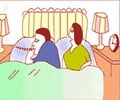A new study from Harvard School of Public Health (HSPH) indicates that blacks are more likely than whites to sleep less than seven hours a night.

The study appears online September 9, 2013 in the American Journal of Epidemiology.
"With increasing numbers of blacks entering professional and management roles in numerous industries, it is important to investigate and address the social factors contributing to the short sleep disparities in blacks compared with whites in general, and particularly in professional settings," said lead author Chandra Jackson, Yerby postdoctoral research fellow in the Department of Nutrition at HSPH.
The researchers analyzed eight years of data, from 2004-2011, from nearly 137,000 U.S. adults who participated in the National Health Interview Survey. Workers from the U.S. Census Bureau interviewed survey participants about their health, lifestyles, jobs, and socioeconomic status. Based on self-reports, 30% of the respondents were considered "short sleepers," sleeping less than 7 hours a night; 31% were "optimal sleepers," sleeping about 7 hours a night; and 39% were "long sleepers," sleeping more than 7 hours a night.
After adjusting for various factors, including age, demographic factors, health behaviors such as smoking and alcohol consumption, physical activity, medical conditions, and socioeconomic status, the researchers found that black workers in general -- and black professionals in particular -- were more likely to experience short sleep than whites. Among black respondents, 37% were short sleepers; among whites, 28%.
In all industries combined, blacks working in professional or management positions were more likely to experience short sleep than their white counterparts (42% vs. 26%). Blacks working in support services were also more likely to experience short sleep than whites (37% vs. 26%), as were laborers, (35% vs. 32%). The only industries in which blacks and whites had similar rates of short sleep were retail and food.
It's also possible, the researchers wrote, that a high work ethic among blacks -- a strong desire to succeed against all odds -- could lead to stress, disrupted sleep, and negative health effects. This phenomenon is known as "John Henryism," referring to a coping strategy in which individuals, beset by stress and social discrimination, expend enormous effort to achieve success -- but can end up damaging their health in the process.
Source-Eurekalert
 MEDINDIA
MEDINDIA




 Email
Email










